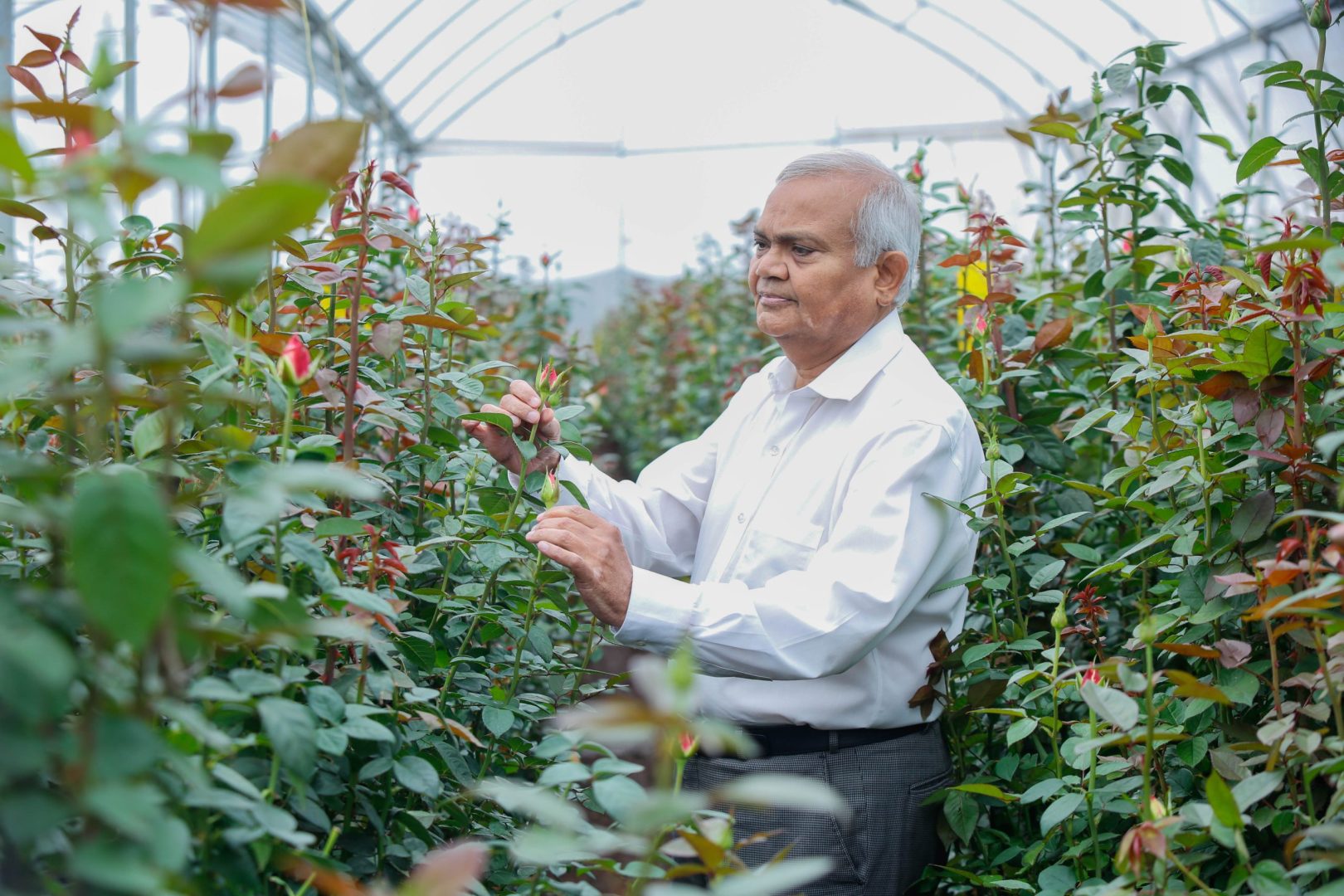Perturbed by the size of his brother’s land in Nakuru that lay idle, Amu Shah spoke to his two siblings, his elder brother Shantilal Shah and younger brother Girish Shah and suggested they look into the flower farming business.
He was in Eldoret at the time, where he was into the quarry business as well as running a vegetable farm. The idea had been planted in his mind one day when he went to visit his friend who had a small farm growing roses. Their father had been a farmer since his childhood and had passed on his knowledge about farming to his sons.
“We started with small six hectares only,” says Shantilal, the Managing Director of Bliss Flora. That marked the birth of their first farm, Buds and Blooms, in 1994, which later grew in size to 12 hectares.
When he thinks about it, Shantilal, who is popularly known as Shanti, says that the family went into the flower business by chance as the land was available. Had his younger brother not mentioned the flower business, chances are high that they would have ventured into something different.
Amu relocated to Perth, Australia, which saw Girish take the reins of managing Buds & Blooms. Later in 2005, Girish followed suit and joined his brother in Australia. Shanti stayed behind and is currently the only one in the family who is in the upper tier of management.
After purchasing the Buds and Blooms farm, Amu and a partner bought 100 hectares of land in Salgaa to start a new flower farm but had to sell the farm when he was relocating because Shanti felt he would be overwhelmed as he had other businesses running on the side too.
He is the founder and owner of Valley Confectionary Ltd, a renowned bakery, known for its famous Tosti bread. He was also running two textile mills in Nakuru at the same time, which he later closed due to severe competition from China.
He and a partner also had another textile mill in Nairobi whose operations were later moved to Uganda, known as Fine Spinners Uganda Limited. Come 2012, Shanti felt he needed to go back to farming. Business was good but land was not enough. “I didn’t have enough land, so that is when I bought these 40 hectares here (Bliss Flora farm), then Dale flora is almost about 35 hectares,” says Shanti.
Bliss Flora is located in Egerton, Njoro region; 30 kilometers west of Nakuru town, where the climate is suitable for flower farming. According to Shanti, understanding the dynamics of a business is very important as it saves you unnecessary turmoil.
For example, “The first year of flower production is 50% productive as it takes a minimum of 45 to 75 days for the first flower flushes to come out and once they do, productivity increases as the years go by and when the plant has gotten enough strength, production is maximized.”
The growth of the farm is attributed to the calculated and intentional direction from the top management. The management strives to have skilled manpower and conducts flower farming training sessions to their workers.
Shanti has managed to scale up success by embracing the rapid changes in technology that have evolved over the years. Before the modernization of his flower business, they used wooden poles to build the structure for the greenhouses but have since moved on using steel structures, which last longer.
At the farm, introduction of technology mainly improved productivity. Currently, the flower stems are watered through a computerized system that ensures each flower stem receives the same amount of fertilizer or water everyday which translates to quality standard produce. Before he introduced farm transport systems, his farm workers would pick the flowers from the greenhouse and take them to the cold room by hand using trolleys. Flower packaging systems have also changed from doing 20 stems to 10 stems, all dependent on the need of the customer.
Shanti goes on to add that years ago it was difficult to track the flower journey before they got to the consumer but they now have a tracking system that sees the flower from when it leaves the farm to the airspace and all the way till it lands to the consumer.
The management also noticed that farming on soil repeatedly leads to exhaustion and this made them shift to use of hydroponic systems. Shanti has also overseen the growth of the distributor and exporters’ territory from only Holland to entering new markets such as Middle East, Australia, Russia and Japan.
Even as Bliss Flora aggressively pursues opportunities locally and beyond, it still grapples with the challenges in cost of living. “Every year inputs are going up like fertilizer chemicals. Availability of fertilizer for next year is also a challenge.
If there is some rebate from the government in terms of duties, that will help the farmers. Markets are also fluctuating as we have competition from Ethiopia at the moment because they are coming in a big way,” says Shanti.
After the Covid-19 pandemic hit, a lot of freighters withdrew their flights from Kenya and the biggest challenge that came with that was increased air charges and lack of air space as well. Europe was also closed and being their biggest exporter, demand for flowers went down. “Other challenges include taxes by government agencies like (KEPHIS) Kenya Plant Health Inspectorate Service, now the county wants to put their own cess which are all double taxation to us,” he laments.
Despite all this, the success of Shanti’s business has largely been attributed to focus and good management skills. The task ahead is to continue building the business to greater heights.
“We can see opportunities in flower farming and with the right markets and the right intervention from the government, this industry will survive,” he concludes.

 Shantilah Shah, Managing Director of Bliss Flora inspect flowers at the farm.
Shantilah Shah, Managing Director of Bliss Flora inspect flowers at the farm.









